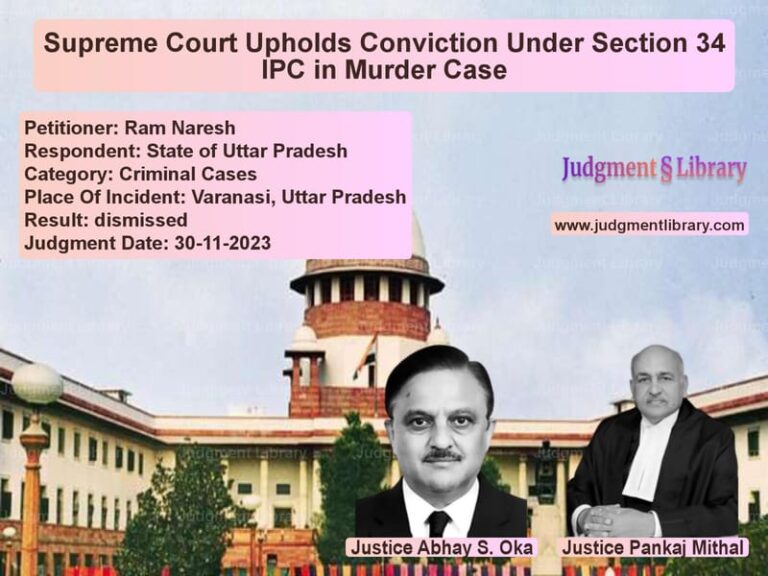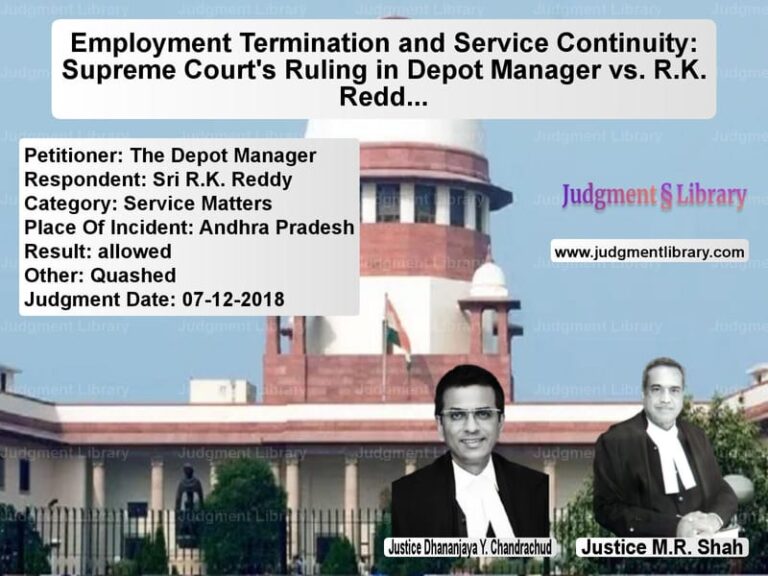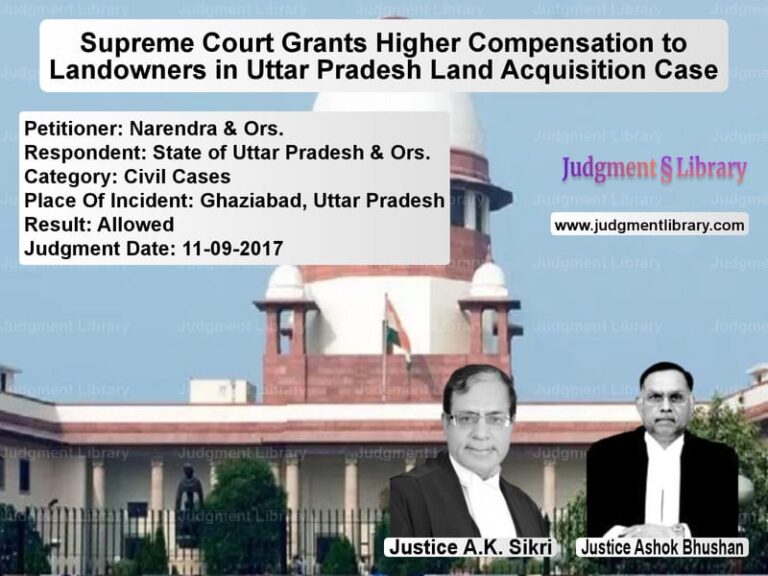Supreme Court Upholds CIC’s Power to Constitute Benches and Frame Regulations
The Supreme Court of India, in the landmark case of Civil Appeal No. 2230 of 2012, has delivered a significant ruling on the autonomy and powers of the Central Information Commission (CIC). This case stemmed from a challenge to the authority of the CIC in constituting benches and framing regulations under Section 12(4) of the Right to Information (RTI) Act, 2005. The Delhi High Court had previously held that the CIC had no power to frame the Central Information Commission (Management) Regulations, 2007 and that it could not delegate inquiries to external committees. However, the Supreme Court has overturned this ruling, affirming the CIC’s powers and emphasizing the necessity of institutional autonomy for administrative bodies.
Background of the Case
The case originated when Mr. Sarbjeet Roy filed an application under the RTI Act, seeking information about the ongoing modifications to the Master Plan of Delhi 2021 (MPD 2021). He also requested directives to the Delhi Development Authority (DDA) to ensure compliance with Section 4 of the RTI Act, which mandates proactive disclosure of public information.
In response, the CIC constituted a committee to examine the issue of non-compliance by the DDA and directed the Vice-Chairman of the DDA to appear before it. Aggrieved by this directive, the DDA challenged the CIC’s authority before the Delhi High Court, which ruled against the CIC.
Key Issues Raised Before the Delhi High Court
The Delhi High Court examined the following three key questions:
- Whether the CIC had the power to appoint a committee comprising non-members to investigate the implementation of RTI Act obligations by public authorities like the DDA.
- Whether the Chief Information Commissioner (CIC) had the power to frame the Central Information Commission (Management) Regulations, 2007 under Section 12(4) of the RTI Act.
- Whether the CIC could summon high-ranking officials, such as the Vice-Chairman of the DDA, during its proceedings.
Delhi High Court’s Ruling
The Delhi High Court ruled against the CIC, stating:
- The CIC lacks the authority to appoint committees of non-members for investigations.
- The CIC had no legislative power to frame the 2007 Regulations as they went beyond procedural management and affected substantive rights.
- The CIC cannot summon high-ranking officials, as such powers are reserved for judicial authorities like the High Courts and the Supreme Court.
Arguments by the Appellant (CIC)
The CIC, represented by Attorney General of India Mr. R. Venkataramani, presented the following arguments before the Supreme Court:
- Section 12(4) of the RTI Act grants the CIC general superintendence, direction, and management powers, which inherently include the ability to constitute benches and frame regulations for internal administration.
- The absence of explicit provisions in the RTI Act does not restrict the CIC’s authority to take necessary administrative measures.
- The formation of benches is necessary due to the high volume of cases (approximately 20,000 annually).
- The CIC’s internal regulations do not infringe upon the legislative domain but serve as essential procedural frameworks to enhance efficiency.
Counterarguments by the Respondents
The DDA and Sarbjeet Roy presented the following counterarguments:
- The RTI Act does not explicitly provide for the formation of benches.
- The Department of Personnel and Training (DoPT) had consistently maintained that orders by single-member benches of the CIC were invalid.
- The CIC’s attempt to summon the Vice-Chairman of the DDA exceeded its jurisdiction.
- The delegation of inquiry powers to a non-member committee violated the statutory framework.
Supreme Court’s Ruling
The Supreme Court, led by Justices Vikram Nath and Satish Chandra Sharma, delivered the following key findings:
- The High Court’s interpretation was too restrictive and failed to acknowledge the broad authority granted under Section 12(4) of the RTI Act.
- The CIC’s power of superintendence necessarily includes the ability to frame regulations and constitute benches.
- The absence of explicit statutory provisions does not negate the existence of implied administrative powers.
- The CIC’s autonomy is essential for the effective implementation of the RTI Act.
Legal Precedents Considered
The Supreme Court referenced key precedents, including:
- Election Commission of India v. Ashok Kumar (2000) – Interpreted “superintendence, direction, and control” to include broad regulatory powers.
- Union of India v. Association for Democratic Reforms (2002) – Held that constitutional authorities have implied powers where legislation is silent.
Conclusion
The Supreme Court’s ruling reaffirms the importance of institutional autonomy for quasi-judicial bodies like the CIC. It ensures that the CIC can effectively manage its workload and continue upholding the public’s right to information. By setting aside the Delhi High Court’s judgment, the Supreme Court has strengthened the RTI framework and reinforced the principle that administrative bodies must be allowed to regulate their own internal affairs.
Petitioner Name: Central Information Commission.Respondent Name: Delhi Development Authority & Anr..Judgment By: Justice Vikram Nath, Justice Satish Chandra Sharma.Place Of Incident: Delhi.Judgment Date: 10-07-2024.
Don’t miss out on the full details! Download the complete judgment in PDF format below and gain valuable insights instantly!
Download Judgment: central-information-vs-delhi-development-au-supreme-court-of-india-judgment-dated-10-07-2024.pdf
Directly Download Judgment: Directly download this Judgment
See all petitions in Contract Disputes
See all petitions in Consumer Rights
See all petitions in Public Interest Litigation
See all petitions in Judgment by Vikram Nath
See all petitions in Judgment by Satish Chandra Sharma
See all petitions in allowed
See all petitions in supreme court of India judgments July 2024
See all petitions in 2024 judgments
See all posts in Civil Cases Category
See all allowed petitions in Civil Cases Category
See all Dismissed petitions in Civil Cases Category
See all partially allowed petitions in Civil Cases Category







